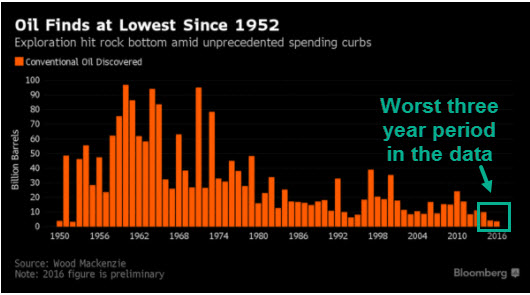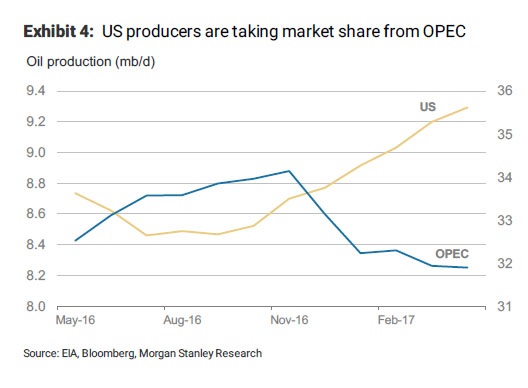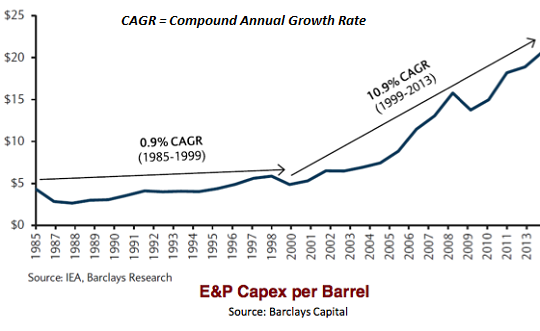In this
scenario, time is running out for Saudi Arabia's free-spending royalty and
state-- and for all the other free-spending oil exporters.
While
there are numerous dynamics at work in the turmoil roiling Saudi Arabia and by
extension, the Mideast, one way to cut to the chase is to follow the
oil, follow the money. Correspondent B.D. recently posited
a factor that has been largely overlooked in the geopolitical /
fate-of-the-petrodollar discussions:
Perhaps the core dynamic is a technical one of diminished oil
production. Here is Bart's commentary:
"I
think the Saudis may be quickly running out of profitable oil to
produce/export.
I
think they tried to over-produce for a while to damage the competition... and
they now have production issues resulting from that. (As has happened in the
past)
I
think they may have recently slipped over the event horizon for being the
world's swing producer of 'cheap-ish and abundant' oil. That has huge
ramifications for the global markets ability to quickly respond to supply/demand
fluctuations.
I
suspect they’re no longer cutting production voluntarily ... they are now in
the grip of a technically driven decline in output. (Why else begin selling off
ARAMCO now?)
I
doubt that many national economies can handle $70+ oil for very long... price
will be limited by the ability of the consumers to pay. What I assume should
happen is relentless severe volatility in the absence of a big swing producer
that can open up or shut in production with comparative ease."
Thank
you, B.D. Let's start with what's well-established about Saudi oil
production:
1. The days of sticking a straw in the sand and oil gushing out
are long gone. Oil production now depends on costly technologies such as
pressurizing the wells with seawater, CO2, etc.
2. The soaring population of Saudi Arabia is dramatically
increasing domestic consumption of the Kingdom's oil, reducing the amount of
oil available for export.
3. The industry is skeptical of official Saudi estimates of
proven reserves and production capacity.
Let's
sketch a conjectural scenario which explains the extraordinary purges and power
plays underway in Saudi Arabia:
1. As B.D. posited, Saudi production is already flat-out, and
there is no million-barrel-per-day slack that can be brought online to depress
global prices, crushing competitors and maintaining control of crude prices. In
other words, the Saudis no longer have the technical / production capability
needed to control global oil pricing-- a power that they've enjoyed since 1973.
2. Saudi production is declining due to technical/real-world
factors (depletion of super-major fields, etc.) that cannot be overcome at a
financial cost that make sense at $50/barrel oil.
3. The possibility of a global recession unfolding in 2018 is
rising. In a global recession, oil demand will fall, crushing the marginal
pricing power of exporters.
4. The Saudi royal family and the Kingdom's vast state welfare
system is no longer sustainable should oil fall into the $30-$35/barrel range
due to a collapse of global demand.
5. The only way out is to grab the power now that will be needed
to slash domestic welfare and domestic consumption of oil/gas, i.e. the power
to overcome resistance within the royal family to severe reductions in
royal/central state budgets.
Geopolitically
speaking, very few if any oil exporters are able to prosper and fund their
regional/global ambitions if oil plummets to $35/barrel and stays there for
years. Every oil exporter makes brave statements about being just
fine with $25/barrel oil, but the reality is every major oil exporter is
dependent on oil revenues of a scale that can only be generated at $50/barral
and up.
The
discovery of new oil fields has fallen far below global consumption.

Meanwhile,
U.S. producers have taken market share away from OPEC exporters, effectively
reducing their influence over prices, as U.S. producers are to some degree the
marginal swing producers.

The
costs of exploration and production changed around the turn of the 21st
century. The cost of discovering, extracting, refining and
transporting new oil have increased dramatically.

All
this suggests oil will have to become more costly for it to make financial
sense to produce it. But as B.D. observed (and analyst Gail Tverberg has
explained in great detail), oil-consuming economies will be pushed into
stagnation/recession by significantly higher oil prices.
Will China Bring an Energy-Debt
Crisis? (Our Finite World, Gail Tverberg)
In
this scenario, time is running out for Saudi Arabia's free-spending royalty and
state-- and for all the other free-spending oil exporters. As
a global recession looms ever closer, every oil exporter edges closer to the
event horizon of financial, social, and political disorder and upheaval.
Venezuela is just the first domino that's toppling. The Saudi leadership is
trying to avoid being in the line of oil exporting dominoes that will fall in
the 2018 global recession.
If you found value in this content, please join me in seeking solutions by becoming a $1/month patron of my work via patreon.com.
If you found value in this content, please join me in seeking solutions by becoming a $1/month patron of my work via patreon.com.